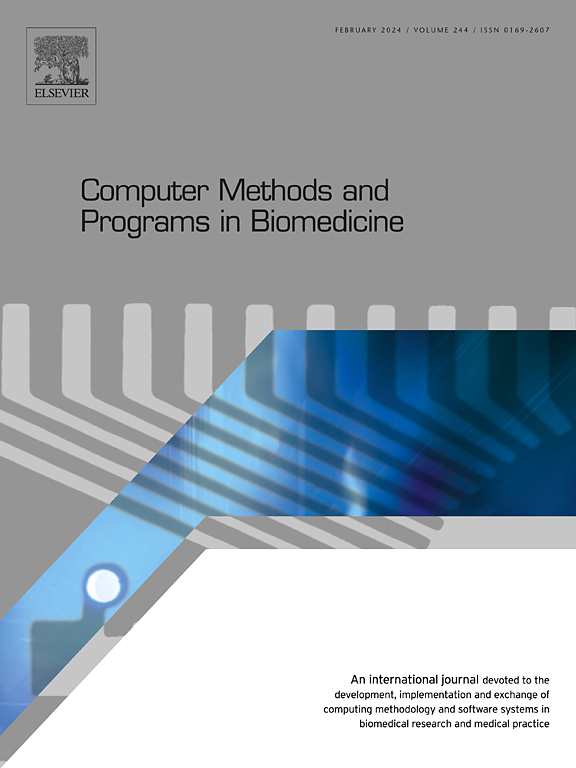DFC-Igloo:用于识别早产儿神经发育生物标志物的动态功能连接组学习框架。
IF 4.9
2区 医学
Q1 COMPUTER SCIENCE, INTERDISCIPLINARY APPLICATIONS
引用次数: 0
摘要
背景和目的:极早产儿容易出现神经发育障碍,因此有必要及早检测预后生物标志物,以便及时干预。本研究旨在利用静息态 fMRI 技术探索早产儿出生时可能存在的功能性生物标志物,这些标志物与早产儿未来的认知和运动发育有关。之前的研究受限于样本量,而且缺乏高效的功能连接组(FC)构建算法,无法处理新生儿时间序列中包含的噪声数据,导致研究结果模棱两可。因此,我们首先提出了一种增强型功能连接组构建算法作为前提步骤。然后,我们将新的功能连接组构建算法应用于我们的大型前瞻性早产儿队列,以探索多层次的神经发育生物标志物:方法:结构连接组(SC)和功能连接组之间存在内在联系,两者之间有明显的耦合。这一观察结果意味着SC上也存在图信号平滑的假定属性。然而,这一特性尚未被充分利用来构建内在的 dFC。在这项研究中,我们提出了一种先进的动态 FC(dFC)学习模型--dFC-Igloo,它利用 SC 信息,通过将图信号平滑性应用于 FC 和 SC 来迭代改进 dFC 估计。该模型在人工小世界图和模拟图信号上进行了评估:结果:在不同的噪声水平和模拟 SC 对中,所提出的模型都能最好、最稳健地恢复地面实况图。该模型进一步应用于来自五个新生儿重症监护室的一组早产儿,为每个婴儿获得了增强的 dFC。根据改进后的 dFC,我们确定了新生儿在整个连接体、区域和子网范围内的神经发育生物标志物:结论:确定的标记物与认知和运动发育结果相关,有助于了解早期大脑发育和潜在的神经发育挑战。本文章由计算机程序翻译,如有差异,请以英文原文为准。
DFC-Igloo: A dynamic functional connectome learning framework for identifying neurodevelopmental biomarkers in very preterm infants
Background and Objective
Very preterm infants are susceptible to neurodevelopmental impairments, necessitating early detection of prognostic biomarkers for timely intervention. The study aims to explore possible functional biomarkers for very preterm infants at born that relate to their future cognitive and motor development using resting-state fMRI. Prior studies are limited by the sample size and suffer from efficient functional connectome (FC) construction algorithms that can handle the noisy data contained in neonatal time series, leading to equivocal findings. Therefore, we first propose an enhanced functional connectome construction algorithm as a prerequisite step. We then apply the new FC construction algorithm to our large prospective very preterm cohort to explore multi-level neurodevelopmental biomarkers.
Methods
There exists an intrinsic relationship between the structural connectome (SC) and FC, with a notable coupling between the two. This observation implies a putative property of graph signal smoothness on the SC as well. Yet, this property has not been fully exploited for constructing intrinsic dFC. In this study, we proposed an advanced dynamic FC (dFC) learning model, dFC-Igloo, which leveraged SC information to iteratively refine dFC estimations by applying graph signal smoothness to both FC and SC. The model was evaluated on artificial small-world graphs and simulated graph signals.
Results
The proposed model achieved the best and most robust recovery of the ground truth graph across different noise levels and simulated SC pairs from the simulation. The model was further applied to a cohort of very preterm infants from five Neonatal Intensive Care Units, where an enhanced dFC was obtained for each infant. Based on the improved dFC, we identified neurodevelopmental biomarkers for neonates across connectome-wide, regional, and subnetwork scales.
Conclusion
The identified markers correlate with cognitive and motor developmental outcomes, offering insights into early brain development and potential neurodevelopmental challenges.
求助全文
通过发布文献求助,成功后即可免费获取论文全文。
去求助
来源期刊

Computer methods and programs in biomedicine
工程技术-工程:生物医学
CiteScore
12.30
自引率
6.60%
发文量
601
审稿时长
135 days
期刊介绍:
To encourage the development of formal computing methods, and their application in biomedical research and medical practice, by illustration of fundamental principles in biomedical informatics research; to stimulate basic research into application software design; to report the state of research of biomedical information processing projects; to report new computer methodologies applied in biomedical areas; the eventual distribution of demonstrable software to avoid duplication of effort; to provide a forum for discussion and improvement of existing software; to optimize contact between national organizations and regional user groups by promoting an international exchange of information on formal methods, standards and software in biomedicine.
Computer Methods and Programs in Biomedicine covers computing methodology and software systems derived from computing science for implementation in all aspects of biomedical research and medical practice. It is designed to serve: biochemists; biologists; geneticists; immunologists; neuroscientists; pharmacologists; toxicologists; clinicians; epidemiologists; psychiatrists; psychologists; cardiologists; chemists; (radio)physicists; computer scientists; programmers and systems analysts; biomedical, clinical, electrical and other engineers; teachers of medical informatics and users of educational software.
 求助内容:
求助内容: 应助结果提醒方式:
应助结果提醒方式:


